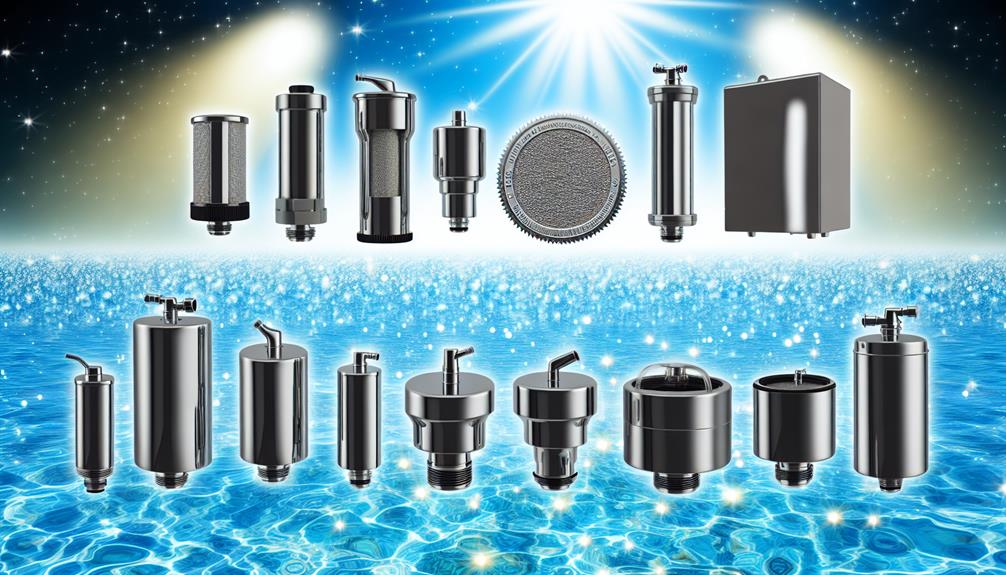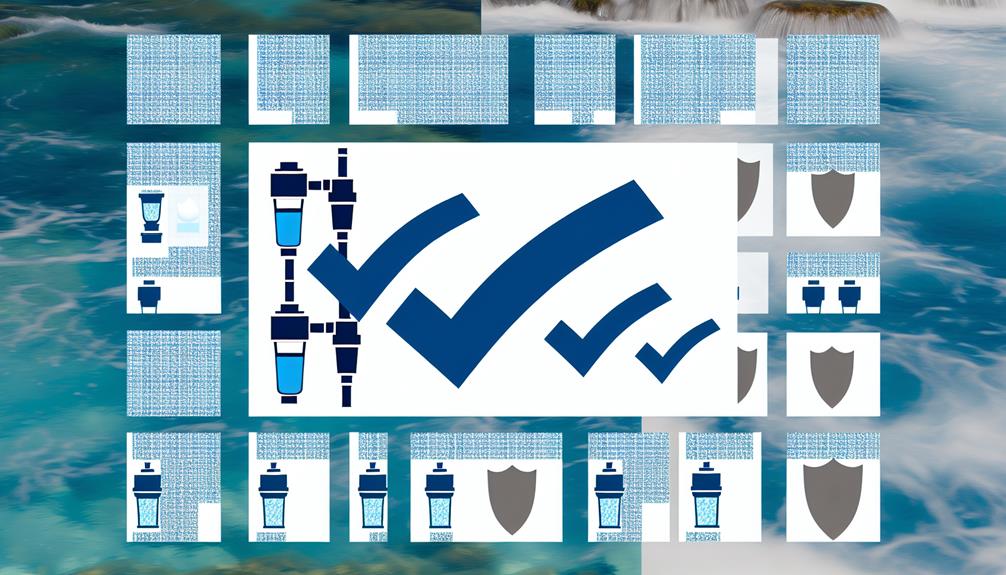Imagine you've just moved into a picturesque neighborhood, only to find out that the tap water has a peculiar taste, hinting at the presence of contaminants. As you stand there, glass in hand, you're faced with the reality that not all water filters are created equal.
You're probably asking yourself how you can ensure the water you and your family drink is safe and free from harmful substances. It's essential to know that certified health-compliant water filters can significantly reduce the risk, but there's a catch – you need to choose the right one.
In the following guidelines, you'll discover how to navigate the maze of certifications, filter types, and maintenance tips that will help you find a filter that meets your specific needs. You'll also learn why simply opting for the most popular brand or the one with the best reviews might not be the best choice for your home's unique water quality challenges.
Assess Local Water Quality
Before investing in a water filter, you should investigate your local water quality to understand the specific contaminants you may need to address. Begin by obtaining the most recent water quality report, often available from your city water supplier. This report, mandated by the Environmental Protection Agency (EPA), provides data on regulated contaminants in public water systems and reflects compliance with the Safe Drinking Water Act. It's typically distributed annually and is known as the Consumer Confidence Report.
If you rely on a private well, you'll need to have your water tested at a certified drinking water lab to identify common contaminants affecting your drinking water quality. Don't be swayed by product claims that seem too good to be true; instead, seek independent verification of a water filter's efficacy—NSF certification is a reliable indicator.
The Environmental Working Group (EWG) also offers a comprehensive guide to local water quality and potential pollutants. Their database allows you to analyze local water data with a broader scope of contaminants beyond those regulated by the EPA. Armed with precise knowledge about your local water, you can select a water filter that effectively targets the specific contaminants you face.
Understand Certification Standards
Ensuring that your chosen water filter is certified by NSF International or the Water Quality Association is a critical step in safeguarding your health against contaminants. These certifications are your assurance that the product meets specific standards for Safe Drinking Water. When a water filter is NSF certified, it has undergone rigorous testing to confirm that it's certified to reduce certain contaminants.
To understand certification standards, it's important to recognize that not all filtration systems are created equal. NSF International and the Water Quality Association certify water filter products against established health and safety criteria. They check claims made by manufacturers, ensuring that the systems perform as advertised.
As you assess water filter options, look for the NSF certification mark or the Water Quality Association seal. These indicate that the product has been tested by a reputable certifying agency. Be wary of uncertified products that may not provide the level of filtration promised.
Select Contaminant-Specific Filters
To ensure your water filter meets health standards, you must first identify the target contaminants in your supply.
Choose a filter type with a certification that guarantees reduction of those specific chemicals, as detailed in the Contaminant Reduction Claims Guide.
Verify the model numbers listed for the filter type are independently certified by organizations like NSF International to effectively remove the contaminants you're concerned about.
Identify Target Contaminants
Identifying the specific contaminants in your water is crucial for selecting a filter that meets health compliance standards. Start by testing your water to determine if tap water is contaminated with specific contaminants, which dictates the necessity for targeted drinking water treatment.
Employ the Contaminant Reduction Claims Guide to match identified water contamination issues with suitable water filters, ensuring they're NSF certified for efficacy against those pollutants.
Carbon filters excel in trapping volatile organic compounds, while reverse osmosis filters are adept at reducing a broader spectrum of contaminants. To ensure reliability, check for independent verification like NSF certification to uphold accuracy in product claims.
Additionally, consult CR's ratings for a precise analysis of certified filters' effectiveness and visit the NSF website for updates on quality water filters and replacement options.
Filter Type Suitability
Selecting a water filter that aligns with the specific contaminants in your water supply is imperative for maintaining optimal health standards. Consult the Contaminant Reduction Claims Guide to determine which filter types—be it water filter pitchers, countertop filters, faucet-mounted filters, or under-sink filters—are certified to reduce the chemicals of concern. Emphasize filter types utilizing carbon, ion exchange, or activated carbon technologies, as these are often effective in removing a wide range of contaminants.
Ensure you're regularly changing filter cartridges to preserve the filter's effectiveness. Moreover, only use aftermarket filters that adhere to the original's standards. For credibility, verify NSF certification and diligently research any unfamiliar logos associated with the water filter you're considering.
Certification Standards Overview
Having established the importance of choosing a filter type based on the specific contaminants in your water supply, it's crucial to understand the certification standards that validate a filter's contaminant reduction capabilities.
Here's a certification standards overview:
- NSF International: Ensures water treatment devices meet rigorous health and safety standards for drinking water treatment.
- Water Quality Association: Provides certification for water treatment systems that effectively reduce harmful contaminants.
- Contaminant Reduction Claims Guide: Helps you select a filter that meets your needs, certified for specific contaminants.
- Chemicals Not Regulated: Be aware some chemicals aren't regulated, so filters must be replaced according to manufacturer recommendations to maintain public health.
When water filter buying, choose based on these standards to ensure the treatment system you select addresses the contaminants of concern.
Compare Filter Technologies
When choosing a water filter, it's crucial to analyze the technologies behind various systems to ensure they meet your specific health requirements and financial constraints.
Water filtration encompasses a range of filter technologies, each designed to target different contaminants commonly found in your tap water. For instance, if your primary concern is per- and polyfluoroalkyl substances (PFAS), you'll need a filter that's been certified to remove these chemicals effectively.
Different types of filters, from pitcher filters to whole-house systems, employ varied methods such as activated carbon, reverse osmosis, or ion exchange to purify water. Evaluate the filtration capacity of each system to align with your daily water consumption. While pitcher filters are economical and convenient for small quantities, whole-house systems provide a comprehensive solution but entail a higher initial investment.
Consider the longevity of replacement filters and the ongoing maintenance costs, as some filtration systems require frequent filter changes which can add up over time. Always verify manufacturers' claims by consulting independent sources to ensure the filter fits the water quality issues in your area.
Evaluate Filter Capacity
After carefully comparing filter technologies, it's essential to assess the actual filtration capacity to match your daily water usage. You want to ensure the water filter systems you consider can handle the volume of water you consume. Here's how you can evaluate the filter capacity:
- Determine Daily Consumption: Calculate how many gallons of water you and your family use daily. This includes drinking, cooking, and other uses.
- Analyze Filter Capacity: Look for filters that can provide enough clean water based on your needs. Filter capacity is often listed in gallons and correlates with the filter's life span.
- Check Flow Rate: Some water filters work quickly, while others take longer. If you require a constant and quick supply of clean water, opt for a higher flow rate.
- Life Span Expectancy: Understand the expected life span of the filters available. This represents how long the filter will last before it needs replacing, based on the volume of water it can purify.
Before buying a water filter, it's also wise to perform water testing to identify specific contaminants you need to target. This information can help you choose a system designed to improve water quality effectively, ensuring the filtration system you invest in is both efficient and suitable for your household.
Maintenance and Replacement Cycles
To ensure your water filter continues to operate at peak efficiency, it's crucial to adhere to recommended maintenance and replacement cycles.
Regular changes to your water filter systems are vital for maintaining the effectiveness against contaminants commonly found in unfiltered water. Many filters come with indicators that signal when a replacement is necessary, ensuring you're less likely to clog the system and that the quality of filtered water isn't compromised.
It's important to verify that any aftermarket filters you choose meet the same standards as the original to prevent any substances that should be detected in the water from being found in your water. Always follow the manufacturer's instructions for replacing the filter, especially after a boil-water notice, to guarantee that your system is functioning correctly.
Stay informed about the latest in maintenance and replacement cycles by checking updates on the NSF (National Sanitation Foundation) website. This ensures that you're using filters compatible with your specific brands and models.
Budget Considerations
While ensuring your water filter is maintained and replaced on schedule is essential for health, it's equally important to weigh the costs involved with these processes in your budget planning. As you consider buying a water filter system for your home water, reflect on the best water filtration solution that aligns with your financial constraints. The filter you choose should meet both your health and budget considerations without sacrificing quality.
Here are key factors to analyze:
- Initial Purchase Cost: Assess the upfront expense of water filter systems, including water softeners if hard water is an issue. Pitchers and faucet-mounted filters typically require less investment than under-sink or whole-house models.
- Maintenance Expenses: Calculate the ongoing costs for replacing filters. Some systems may be easy to use but have higher long-term expenses due to frequent filter changes.
- Replacement Frequency: Determine how often you'll need to replace filters. This affects the total cost of ownership and should influence the filter system selection.
- Space and Accessories: Consider the cabinet space required and any additional components. Smaller, more budget-friendly options might save on space and initial costs but could lack the longevity and robustness of larger systems.
Choose wisely to ensure that the health compliance of your water filtration doesn't overextend your budget.
Verify Manufacturer Claims
Ensure the effectiveness of your water filter by confirming the manufacturer's contaminant removal claims against independent NSF/ANSI standards. As you seek the Right Water Quality for your home, it's critical to scrutinize the filter systems you consider. With the varying quality of nations' tap water and the updated water guidelines, verifying manufacturer claims isn't just prudent—it's essential.
When assessing filters, look for NSF certification on the label. This mark indicates the filter has undergone rigorous testing and meets stringent standards for removing specific contaminants, including per- and polyfluoroalkyl substances (PFAS), which are increasingly a concern in community water supplies. Don't just take the manufacturer's word for it; cross-reference the stated capabilities with NSF's database to ensure accuracy.
Additionally, check the water filter packaging or accompanying literature to identify the contaminants it claims to reduce. Match these claims with the NSF certification to verify that the filter system you choose is indeed capable of delivering the promised water quality.

